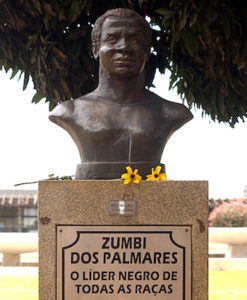
Zumbi (bust)
The life of Zumbi in 1655 is celebrated on this date. He was an Afro Brazilian abolitionist and soldier.
Zumbi pronounced: "Zoom-bee") was an Afro Brazilian slave and one of the most famous leaders of Palmares. He was given to a missionary, Father Antonio Melo, as a child at age 6. He was baptized Francisco Zumbi, was taught the sacraments, learned Portuguese and Latin, and helped with daily mass.
Despite attempts to "convert" him, Zumbi escaped in 1670 and returned to his birthplace at the age of 15. Zumbi became known for his physical prowess and cunning in battle and was a respected military strategist in his early twenties.
In 1678, the governor of the captaincy of Pernambuco offered its leader, Ganga Zumba, freedom for all runaway slaves if Palmares would submit to Portuguese authority, a proposal that Ganga Zumba favored. Zumbi rejected the deal and challenged Ganga Zumba's leadership. Vowing to continue the resistance to Portuguese oppression, Zumbi became the new leader of Palmares. Fifteen years later, Portugal mounted an artillery assault on the Quilombo. On February 6, 1694, the Portuguese destroyed Cerca do Macaco after 67 years of ceaseless conflict with the cafuzos, or Maroons (a Portuguese term describing the first-generation offspring of a black African and an Amerindian) of Palmares.
Zumbi was wounded, betrayed, captured almost two years later, and immediately executed (beheaded) on November 20, 1695. November 20 is celebrated as a day of national pride, chiefly in Rio de Janeiro. The day has special meaning for Afro Brazilians, who honor him as a hero, freedom fighter, and a symbol of freedom. Zumbi was the last of Quilombo dos Palmares' leaders in the present-day state of Alagoas, Brazil.